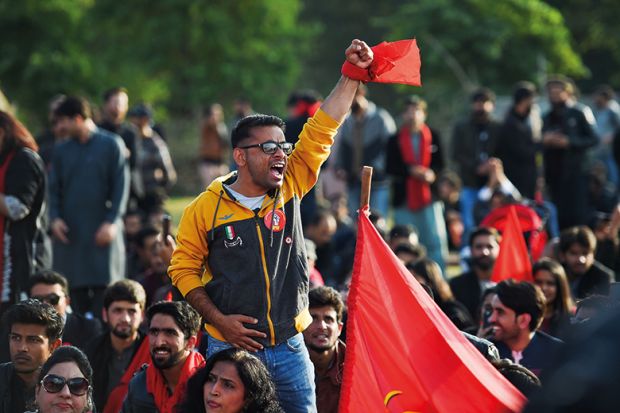Decades after Pakistan’s government outlawed student unions, one of its provinces has brought them back – a move supporters hope will spread to the rest of the country, promoting a culture of peaceful political engagement.
Last month, officials in Sindh province – home to Pakistan’s largest city, Karachi, as well as 64 of the country’s 233 universities – agreed to allow student unions for the first time since they were banned in 1984.
Now, some hope their return will help tackle issues affecting campuses, including student violence and sexual harassment. Under the new law, universities will need to include at least one student union member in their senate or board.
Murtaza Noor, national coordinator of the Inter University Consortium for Promotion of Social Sciences in Pakistan, said that the province’s reinstatement of student unions was a “significant development”.
He noted that traditionally the unions helped “inculcate values of leadership, peace, coexistence, active and effective citizenship among students” and were also “considered a nursery for future leadership”.
Uzera Nishat, a visiting faculty member at Quaid-e-Azam University in Islamabad, called the move “historic” and said it would create a “ripple effect”.
“The power and potential of youth, which is more than 60 per cent of Pakistan’s population, needs to be actively and productively engaged,” she said, adding that reinstating student unions could “lay the foundation of active youth engagement in the country’s political and development long-term agenda”.
Unlike student-led wings of political parties, which already exist in Pakistan, student unions do not advocate for a specific political or religious group. In another key distinction, the representatives of student unions are elected by students, while those of political parties are appointed.
The development in Sindh province comes amid student rallies across Pakistan urging support for the reinstatement of student unions elsewhere.
While the 1984 ban did not entirely stop students from advocating, their power was largely confined to single-issue “student action committees”, which disbanded after achieving their aims.
“Older graduates who were part of the student movement 40 years ago welcome this,” said Hussain Kalwar, who was a student leader when he attended Quaid-i-Azam University in the 1990s and is now vice-president of the QAU Alumni Association. “Students are a separate segment of society…they must have their separate entity.”
The current lack of a centralised lobby for students left them more vulnerable in conflicts with their university administrations, which can “easily manipulate the situation in their favour”, he said.
But it will not be easy starting from scratch after nearly 40 years, academics agreed. And despite widespread support for reinstating student unions, some academics voiced concern over the plan backfiring – with national politics inevitably coming into play.
Zulqurnain Ul Haq, a lecturer in social development and policy at Habib University, noted that there was a worrisome precedent for violence.
“The revival of student unions cannot sideline the bloody past of student politics,” he said, noting that unions were banned precisely because “universities were becoming militarised” – which was aggravated by ethnic conflicts.
Mr Ul Haq cautioned that “the current revival would open up the same platform to the students and may as well pave the way for their politicisation”.
“Although student unions have been restored…political parties need to act responsibly to make sure that students and youth are not misused the way they were used back in history,” he said. “Students should not be used to inject hatred.”
Register to continue
Why register?
- Registration is free and only takes a moment
- Once registered, you can read 3 articles a month
- Sign up for our newsletter
Subscribe
Or subscribe for unlimited access to:
- Unlimited access to news, views, insights & reviews
- Digital editions
- Digital access to THE’s university and college rankings analysis
Already registered or a current subscriber? Login








